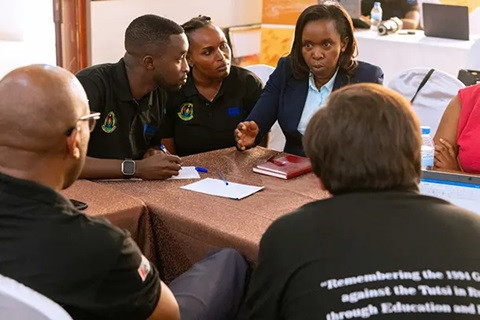
GCED Basic Search Form
Quick Search
أنت هنا
الأخبار

On 22 and 23 May, UNESCO organized Remembering the 1994 Genocide against the Tutsi in Rwanda through Education and Dialogue in partnership with the Rwandan National Commission for UNESCO and Aegis Trust.
Last update: 5 June 2024
Held in Nyamata, Rwanda, this consultation marked the thirtieth anniversary of the genocide and initiated a collaboration to address its lasting impacts.
In light of the recent inscription of the serial property of the Memorial Sites of the Genocide – including the Kigali Genocide Memorial, Murambi Genocide Memorial, Nyamata Genocide Memorial and Bisesero Gencoide Memorial – in the UNESCO World Heritage List, the meeting served as a space to develop an interdisciplinary approach for commemoration and reconciliation leveraging dialogue and education in sites of memory. Government officials, civil society, memorial site managers, youth leaders, and educators were brought together for two days of discussion, experience sharing and commemoration. The meeting included breakout groups led by experts from the Rwandan Ministry of National Unity and Civic Engagement (MINUBUNWE), Rwanda Basic Education Board, AHEZA Healing and Careers Center, Aegis Trust, and United States Holocaust Memorial Museum.

© Aegis Trust
"Let us transform the pain of our past into a beacon of hope for the future. Together, let us ensure the memory of the genocide is never forgotten and that it never happens again."
Pascal Gatabazi (Chief Technical Advisor, Ministry of Education, Rwanda)
Participants noted the progress made over the past thirty years. They also highlighted the need to tackle distortion of history and false narratives, promote intergenerational dialogue, strengthen capacities of teachers, develop the educational dimension of memorial sites, engage youth in commemoration and leverage innovative mediums.
Moving into this next phase of commemoration, it was also emphasized that memorial sites must be recognized as not only sites of mourning and meditation, but also places to ensure sensitive commemoration and remembrance through dialogue and education.

© Aegis Trust
"Memorial sites are not only a home of commemoration and meditation, but also a school of true dialogue, of peace and reconciliation."
Jerome Kajuga (Rwandan National Commission for UNESCO)
The consultation was guided by UNESCO’s Initiative for Enabling Intercultural Dialogue, created by the UNESCO Social and Human Sciences Sector, which aims to support more effective dialogue through data-led guidance. The Initiative has organized consultations globally leveraging the data of the Framework for Enabling Intercultural Dialogue to support countries in building policies and programs to enhance dialogue and achieve outcomes related to peace and inclusion. The consultation also built upon the learnings of UNESCO’s International Program on Holocaust and Genocide Education, which seeks to support Member States in addressing violent pasts of atrocity crimes. Rwanda is currently participating in the current program cycle through a project led by the Kigali Genocide Memorial and Never Again Rwanda, supported by MINUBUNWE, to develop opportunities for intergenerational dialogue about the genocide against the Tutsi, with a particular focus on out-of-school youth and rural regions that may have less access to informed knowledge about the genocide and its history.
Moving forward, UNESCO is committed to continue its collaboration with the Rwandan National Commission and Aegis Trust, as well as with the participants of the meeting, to develop a new initiative for supporting a peace-oriented culture of remembrance in Rwanda through dialogue and education, by leveraging the role of the sites of memory for peace and social cohesion.
